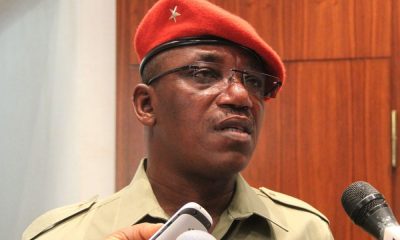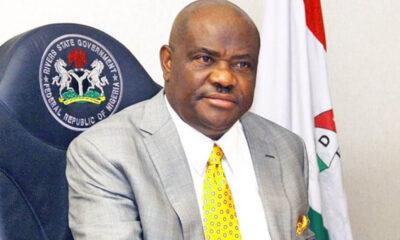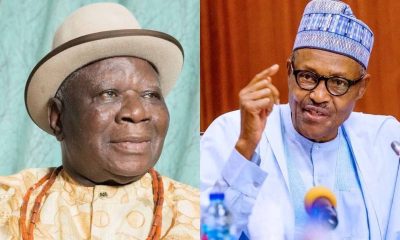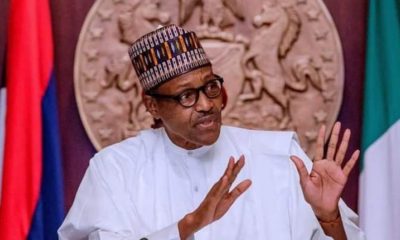Opinion
Buhari At 80: 12 things Nigerians need to know, by Garba Shehu

-First thing to know is that President Muhammadu –Buhari, retired General and former Military Head of State was born in Daura on December 17th, 1942. He lost his father at the early age of three years.
-He was enlisted in primary school by the District Head of Daura, Waziri Alasan and fell under the guardian-ship of his older brother, Alhaji Dauda Daura, Malam Mamman’s father, then a Head Master at Mai Aduwa, from where the young Buhari went to the middle and secondary schools.
-After his education at the now Government College Katsina, he went to the Nigerian Military Training College, Kaduna which is now known as the Nigerian Defence Academy. He trained at the Mons Officer Cadet School, a British Military training school in Aldershot and also attended the US Army War College (USAWC) Carlisle, Pennsylvania and the National Defence College, New Delhi, India.
Apparently, Muhammadu Buhari, as a young officer had already been gifted with “wisdom and strength for the future,” the motto of the USAWC even before he got there.
-The young Buhari was sent by his country to Congo (DRC) on a UN Peace Keeping mission assigned to command a battalion commander, but in carrying out his duty, he almost lost his life before earning his first salary.
Caught in a tricky and the dangerous situation of either protecting a prisoner to face the wrath of 5,000 armed natives and, possibly his losing his life and the relatively small number of 400 men under him, or finding another a solution to mollify the mob, he gathered the needed courage and wisdom to stop a major tragedy from happening.
-As a soldier, he fought in the 30 months Nigerian Civil War and did not take a single day off while the war lasted. He traversed the entire Eastern Region literally on foot and suffered a gun shot in the lower leg. He was the second in command in the battalion that fired the first shot in the war.
-Two. He was a military Governor of the Northeast, now broken into six states as a young Colonel and thereafter, Federal Commissioner (Minister) and Chairman, Nigerian National Oil Corporation, now renamed NNPCL.
As a General, he had the record of commanding all four army divisions they had in -their time. As Military Secretary, he did the meticulous work of the documenting the records of the entire officer corps.
That is why it baffled him to no end that some officers in Army Records Office, obviously playing politics with the issue in 2015, claimed that the army didn’t have his WAEC certificate which was no more than a ploy to stop him as a candidate in the election.
-Three. As a politician with more than 4 million followers on Twitter and an equally huge following on Facebook, Instagram and the others, President Buhari is one of the most popular politicians that this country has ever produced.
-Four. He holds the record of being the first opposition candidate to defeat an incumbent in an election to take office as President of Nigeria. He is the only non-PDP President to win two consecutive terms of four years. He is a charismatic leader with the capability to sway the masses. In all five elections he ran as president, three of which were recorded as losses, there was none in which he got less than 12 million votes.
-Five. The Covid-19 pandemic seized the world by its collar. Covid-19 lockdown shut all businesses and threw people out of their jobs all over the world. National economies slowed down and were in a recession in all countries but China.
Nigerian government under President Buhari pulled out the country out of the Covid-induced recession at a global record time. No Nigerian bodies were picked on the streets from Covid deaths as the pundits projected. In fact, West Africa suffered the least number of casualties in the subregional grouping on the continent, thanks to the ECOWAS COVID-19 Champion, working with regional leadership, the AU and the UN.
Six. In seven-and-a-half years, he is credited with the introduction of some of the country’s long delayed reforms, among these is a most ambitious infrastructure push since the 1970s – delivering roads, rail, ports, power plants, airports etc; and deploying innovative financing mechanisms like the Presidential Infrastructure Development Fund (PIDF), Executive Order 7, Sukuk Bonds, and Green Bonds.
-Seven.He is presiding over the largest program of legislative reforms in Nigeria’s history: the Company and Allied Matters Act, CAMA revised for the first time in 30 years, Prisons Act for the first time in almost 50 years, Police Act for the first time in 70 years. And a surfeit of all the new Acts too – the Nigerian Centre for Disease Control, NCDC, Climate Change, the Suppression of Piracy and Other Maritime Offenses, SPOMO, the Finance Acts, Electoral Amendment, the new Terrorism Act, among others.
-Eight. The President is building the largest social investment program in Africa, and one of the largest in the world, serving tens of millions of Nigerians. The school feeding component, giving a free meal a day to 10 million children has increased school enrollment and lowered the distressing number of out-of-school children in our country.
Nine. The President is successful in rebuilding the confidence of the Nigerian military, and degrading Boko Haram/ISWAP. He has commenced the rebuilding of the Northeast; making the biggest investments made in military platforms and assets in more than 40 years; Police Reforms (New Police Act, Police Trust Fund, Community Policing, Police Recruitment of 10,000 men in uniform every year, community policing, New Police Salary Structure); Nigeria’s Coastal Waters (in the Gulf of Guinea) are the safest they have ever been in almost 3 decades.
Ten. In the sphere of foreign affairs, the President has distinguished himself as a global leader respected by the world. He has enhanced Nigeria’s standing in the International Community.
At the African Union, AU he is the outgoing Anti-Corruption Champion; at the ECOWAS, he has performed wonderfully as Covid-19 Champion; His leadership of the Lake Chad Basin Commission has come to an end with a lot of benefits, not least the degradation of Boko Haram terrorism.
His recent inauguration as the Chairman of the committee of of Heads of State of the African Great Green Wall Agency is to fortify the continent against harmful effects of the climate change.
Under his leadership Nigeria presented Ambassador (Professor) Mohammed Bande, Nigeria’s Permanent Representative as the President of the UN General Assembly, and Mrs Amina Mohammed got appointed and reappointed as the Deputy Secretary General of the UN.
He spearheaded the campaign for the election of Dr. Ngozi Okwonjo-Iweala, NOI as the World Trade Organization, WTO DG- the first for an African and the female gender, and promoted the election and reelection of Akin Adesina for the Second Term in AfDB – in the face of concerted opposition.
He sealed the very helpful military deals with the US Government; made bold interventions to restore stability in Gambia and Guinea Bissau and Nigerians have been pushed into holding leadership positions in recent years at the International Criminal Court, African Civil Aviation Commission, and several others.
-Eleven. Muhammadu Buhari as a young army Colonel and Federal Commissioner for Petroleum Resources was convinced by science, not geopolitics or native instinct that oil and other hydrocarbons were plenty in existence in the Northern States as well as the Southwest and knew that the political stability of the nation will be helped by the sense psychological equality or balancing its discovery could help to bring.
He fought hard for this as Federal Commissioner Petroleum Resources and Chairman of the Nigerian National Petroleum Corporation until his very last day in office but it didn’t work.
When he found himself in office as elected President 30 years after leaving oil, he resumed his passions as oil finder at the Lake Chad Basin area, considered a low hanging fruit until kidnapping and killings by the Boko Haram terrorist group spoiled things up.
Explorations shifted to the Benue trough map and his vindication came by way of the unveiling of the Kolmani Oil Well straddling Bauchi and Gombe states, promising more than a billion barrels of crude oil an over 500 billion cubic feet of natural gas. The project has already attracted over USD 3 billion in investment. For doing the most work to discover the new oil fields, President Buhari deserves a gold medal, and the Asiwaju Bola,Tinubu, an easy ride ride to power for the promise he made to take the explorations further afield.
-Twelve. While the work of nation-building under his incomparable hard work, dedication and creativity continues to advance the country in many ways, the same cannot be said of some follow country who put all manner of obstacles in the way to accomplishing two major projects about which he very passionate:
Completing and commissioning of the Ajaokuta Steel Rolling Mill and construction of the 3, 500 megawatts Mambila Electricity Power Project. Thankfully, the long-drawn legal tussle on Ajaokuta just got ended and the Minister, Solid Minerals Develpment Arch. Olamilekan Adegbite has already hit the road running, hoping to achieve what is possible before the administration ends its term.
While the legal contestation for Ajaokuta was ongoing, the country under President Buhari has begun to record progress in the production of liquid steel through the private sector.
Same however cannot be said of Mambila Power Project where the problems have defied solutions. ChinaExim has withheld funding to Mambila as did the Qatari Sovereign Wealth Fund due to the challenges by one man claiming to have a contract that doesn’t exist anywhere. We are hearing that he wants to be paid on the basis of this improperly awarded contract to be paid money in hundreds of million of US dollars to cover the cost of his litigation. President Buhari is not one to give anyone free money from the treasury.
As he marks this milestone by attaining the age of 80, in extraordinarily state of high physical and mental fitness, Muhammadu Buhari’s life continues to symbolize service to the nation and humanity as well as dedication and commitment to the building of of a secure, stronger and prosperous Nigeria.
Shehu is Senior Special Assistant to the President (Media and Publicity).
Opinion
Ademola Lookman showed Davido and Kemi Badenoch that wisdom is not by age – Omokri
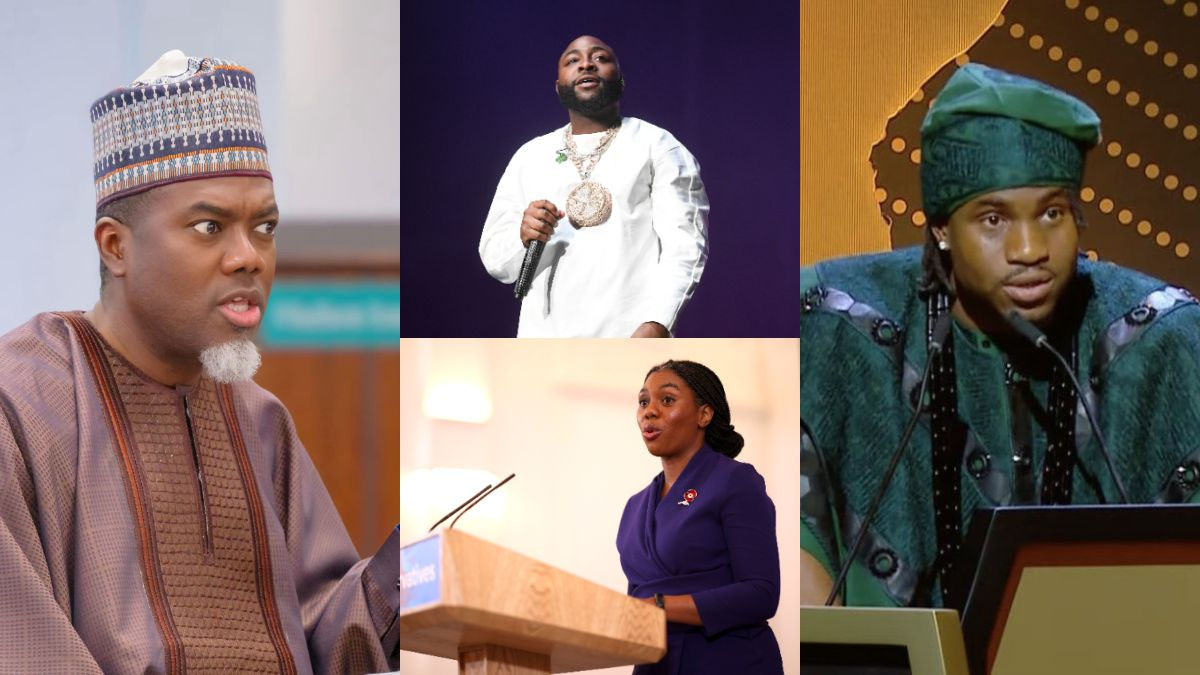
Ademola Lookman showed Davido and Kemi Badenoch that wisdom is not by age – Omokri
Recently, the singer David Adeleke was given a global stage to do whatever he wanted and deliver any message.
Sadly, Mr. Adeleke used the opportunity to speak in an American accent. Not only that, he used that American accent to talk down on Nigeria and tell the world not to invest in Nigeria because, as he put it, Nigeria’s “economy is in shambles”.
Coincidentally, a month after his faux pas, Kemi Badenoch, probably inspired by Davido, used her British accent to talk down Nigeria, calling us “a very poor country” where the police rob citizens.
But the interesting thing about her own case is that the next day, the BBC featured a panel of Conservative Party big shots, and one of them, Albie Amankona, a party chieftain from Chiswick, who is also a celebrity broadcaster, said, and this is a direct quote:
“If you are a Brexiteer, and you are saying we need to be expanding our global trade beyond the European Union, we want to be looking at emerging markets for growth, don’t slag off one of the fastest growing economies in Africa.”
Is it not strange that it took the BBC and a British politician to promote Nigeria as one of the fastest-growing economies in Africa?
And just when we thought it was all bad news, God gave us a breath of fresh air in the youthful Ademola Lookman, who used the global podium granted to him by his winning the 2024 African Footballer of the Year award to promote and project Nigeria and the Lukumi Yoruba language to the world.
READ ALSO:
- MURIC tackles Kemi Badenoch: Can you bring UK police when coming to Nigeria?
- Reps probe $754.2m, N141.6bn tractors, harvesters contract fraud
- Gov Adeleke intervenes in man sentenced to death for stealing fowl (Video)
Wisdom is not by age. If not, Ademola Lookman, who is just twenty-seven, will not have displayed greater wisdom than David Adeleke, who is thirty-two, and Kemi Badenoch, at forty-four.
Mr. Lookman proved that the age of Methuselah has nothing to do with the wisdom of Solomon.
And it is not as though other ethnicities with global icons do not also project Nigeria. They do.
Dr. Mrs. Ngozi Okonjo-Iweala spoke Igbo on the podium of the WTO in Geneva. In terms of prestige, she is FAR above Lookman.
My campaign is not for the Lukumi Yoruba alone. It is for all sub-Saharan Black Africans to learn to speak their language and not use ability to speak English or another colonial language as a measure of intelligence.
Besides Lukumi Yoruba and Hausa, every other Nigerian language, including Fulfulde, is gradually dying out.
General Buhari is half Fulani and half Kanuri. Yet, he cannot speak either Fuifulde or Kanuri. But he speaks Hausa and English.
Fact-check me: In 2012, UNESCO declared Igbo an endangered language.
However, the Lukumi Yoruba are to be commended for their affirmative actions to advance their language and culture.
Let me give you an example. All six Governors of the Southwest bear full Lukumi names: Jide Sanwa-Olu, Seyi Makinde, Dapo Abiodun, Ademola Adeleke, Abiodun Oyebanji, and Orighomisan Aiyedatiwa.
No other zone in Nigeria has all its governors bearing ethnic Nigerian names as first and second names. They either bear Arabic or European names as first names or even first and second names.
If we truly want to be the Giant of Africa, we must take affirmative steps to preserve our language and culture so we can have children like Ademola Lookman.
Teach your language to your children before you teach them English. They will learn English at school. Being multilingual is scientifically proven to boost intelligence.
Fact-check me: In the U.S., Latino kids do not speak English until they start school. They learn Spanish as a first language.
Even if you relocate to the UK, the best you can be is British. You can never be English. And if your choice of Japa is the U.S., the highest you can be is an American citizen. You will never become a White Anglo-Saxon Protestant WASP.
Your power lies in balancing ancient and modern, Western and African, English (or other colonial languages) and your native tongue.
That is the way to reverse language erosion, like the Lukumi Yoruba.
Ademola Lookman showed Davido and Kemi Badenoch that wisdom is not by age – Omokri
Opinion
Kemi Badenoch’s Hate for Nigeria – Femi Fani-Kayode

Kemi Badenoch’s Hate for Nigeria – Femi Fani-Kayode
“I find it interesting that everyone defines me as a Nigerian. I identify less with the country than with my specific ethnic group. I have nothing in common with the people from the north of the country, the Boko Haram, where Islamism is. Being Yoruba is my true identity and I refuse to be lumped with the northern people of Nigeria who were our ethnic enemies, all in the name of being called a Nigerian”- @KemiBadenoch.
Dangerous rhetoric
Kemi Badenoch, MP, the leader of the British Conservative Party and Opposition in the @UKParliament, has refused to stop at just denigrating our country but has gone a step further by seeking to divide us on ethnic lines.
She claims that she never regarded herself as being a Nigerian but rather a Yoruba and that she never identified with the people from the Northern part of our country who she collectively describes as being “Boko Haram Islamists” and “terrorists”.
This is dangerous rhetoric coming from an impudent and ignorant foreign leader who knows nothing about our country, who does not know her place and who insists on stirring up a storm that she cannot contain and that may eventually consume her.
It is rather like saying that she identifies more with the English than she does with the Scots and the Welsh whom she regards as nothing more than homicidal and murderous barbarians that once waged war against her ethnic English compatriots!
All this coming from a young lady of colour that is a political leader in a multi-ethnic, multi-religious and multi-cultural country that lays claim to being the epitome of decency and civilisation! What a strange and inexplicable contradiction this is.
READ ALSO:
- CCT chair removal: Civil groups sue Tinubu, Akpabio, others
- New President-General of Ohanaeze Chukwu to reign for 27 days
- Economy: I derive no pleasure in causing Nigerians pain, says Tinubu
Her intentions are malevolent and insidious and her objective, outside of ridiculing and mocking us, is to divide us and bring us to our knees.
I am constrained to ask, what on earth happened to this creature in her youth and why does she hate Nigeria with such passion?
Did something happen to her when she lived here which she has kept secret?
Kemi Badenoch’s Hate for Nigeria – Femi Fani-Kayode
Opinion
The cockroach called Dele Farotimi (1)

The cockroach called Dele Farotimi (1)
Tunde Odesola
(Published in The PUNCH, on Friday, December 13, 2024)
The official name for cage fight is Mixed Martial Arts. Street fight, known as ‘ìjà ìgboro’ in Yoruba, is the bane of Ibadan people, says the panegyric of Oluyole, the city of brown roofs scattered among seven hills. MMA, I think, is organised street fighting.
But, long before MMA became a global combat sport in 2000, little devils of St Paul Anglican (Primary) School, Idi-Oro, Lagos, and Archbishop Aggey Memorial Secondary School, Mushin, Lagos, engaged in ‘ìjà ìgboro’, the progenitor of Mixed Martial Arts. Retrospectively, I’m guilty of being part of the little devils of both schools.
Because, instead of heeding the ‘blessed are the peacemakers’ injunction in the Holy Scriptures, to ‘inherit the kingdom of God’, what we did as little demons that we were was to add fuel to the embers of hostility smouldering among fellow students.
As soon as you noticed two students in a heated argument, instead of you to sue for peace, the naughty reaction was for you to grab some soil in clenched fists and spread your fists towards the two disputants, daring both pupils to slap one of the outstretched fists: ‘Ení bá lè jà, kó gbon!’
‘Ení bá lè jà, kó gbon!’ was a call to arms. To prove you’re a lionheart ready to fight, you slap the clenched fist open and watch its content pour out to the ground.
So, in a jiffy, you would see friends who were laughing a while ago, engage in a free-for-all instanter. Regrettably, I initiated some of such fights and participated in not a few. You probably can’t grow up in Mushin and be fainthearted.
Taliatu Mudashiru was my friend and classmate in Forms 1 and 2. Occasionally, when I didn’t get dropped off at school by my father, and I had to make it to school on my own, I first trek from our Awoyokun Street residence to Taliatu’s house on Adegboyega Street before both of us would head up to Akinade Ayodeji’s house two blocks away en route to school.
I thought I was stronger than Tali, as we fondly called him, or Pali Tutu (Wet Cardboard) – if the caller was a mischievous classmate – until one day when we disagreed during a break-time chatter involving other classmates.
A peacemaker stepped forward with clenched fists, chanting, ‘K’éyin lè jà, k’émi lé wò’ran, Èsù ta’po si,’ evoking Baba Devil himself. I slapped one of the fists; Tali slapped the other! ‘Ha, Tali ke? I go kill sombodi!’
Toe-to-toe, Tunde rained blows. Tit-for-tat, Tali responded. We upturned desks and seats as the brawl spiralled to the delight of cheering classmates. But it was short-lived as the break-time bell saved the day. We swore at each other but classmates begged us, like peacemakers, to save our punches and wait till after-school hours to throw them.
READ ALSO:
- Gunmen attack Gombe community, kill cleric, set houses ablaze
- CAF awards 2024: Lookman, Nnadozie make final list
- Tinubu’s economic policies causing hunger, poverty – Nigerian gov
After school, excited classmates such as Taliatu Olokodana, Akinade Ayodeji alias Kuruki, Hakeem Adigun alias Slate, Jide Oladimeji alias Agama; Kunle Adeyoju alias Iron Bender, Sunday Pedro Oshokai, Sanmi Okuwobi, Sule Mustapha alias Maito; Olalekan Egungbohun, Kazeem Osuolale alias Oju etc led Tali and me to ‘Ojú Olómo ò to’, an arena so named because no parent or guardian’s eyes ever got to see what happened there.
Only Lukmon Yusuff aka OC, Jide Ajose and Segun Majekodunmi would have separated us if they were around. For his good-naturedness, Jide got the nickname Unreasonable while Segun was called Brother because he belonged to the Deeper Life Church and Yusuff got nicknamed O.C. because of his effectiveness as a football defender.
The ‘Ojú Olómo ò to’ was the playground of a primary school that had closed for the day. Impish classmates sat around the edge of the big field, leaving Tali and I at the centre to unleash the devilry in us.
Tali, bigger and an inch taller, was hoping to use his weight to an advantage, grabbing at me but I knew if he slammed me he would feed me with sand, so I used my fists to keep him off.
We wrestled and boxed and kicked and clawed for God knows how long. There was no referee. There was no timeout. There were only ringside viewers who laughed and cheered every kick and blow and the sight of blood. Tali and I bled all over, spent and gasped for breath.
Then I threw a punch, it caught Tali right in the face, and he first went down in a squat, before flattening out on his back. I should have jumped on him and finished him off, but I was barely breathing. I just left him and I turned away to look for my bag and shoes.
The following day, Tali was looking for me on the assembly ground. He appeared proud of us. He shook hands with me vigorously and we hugged for a long period – like warriors after a pyrrhic victory. He earned my respect, I earned his. Tali probably thought I was a sportsman for not finishing him off when he blanked out, but little did he know that all that was on my mind when he fell was me getting home. I probably would’ve fallen too if the fight had lasted longer.
There are similarities between my fight with Tali and the ongoing fight between one of Nigeria’s heavyweight lawyers, Aare Afe Babalola and human rights activist and lawyer, Mr Dele Farotimi.
I know Nigeria is broken and needs fixing urgently. I know that to fix it, something has to give. I know Nigeria’s coconuts of corruption must be cracked on skulls and the water thereof used as atonement for the nation’s corruption.
READ ALSO:
I see many coconuts. I also see the head of Babalola and that of Farotimi. I see other heads, too. But whose skull(s) would crack open the coconuts?
I see a poisonous cockroach encircled by a brood of chickens. Among the chickens is the breed called Supreme. There’s also a breed called Appeal and another breed called High. There’s yet another breed called SANyeri, a name symbolising the breed’s big gowns. The chickens thrust their heads forward, sharply looking right and left, watching intently, communicating in esoteric language. What shall we do to this irritant?
Yet, the cockroach is adamant in the valley of jeopardy, six legs gangling, two antennas roving; person wey wan don die jam person wey wan kill am.
Tali Vs. Tunde. Today, I can’t even remember what caused the disagreement that snowballed into our fight, but I can never forget the pain of the fight. I had thought I would make light work of Tali but I didn’t see his gallantry coming.
Although I’ve never met Baba Babalola, he comes across as a man of commendable philanthropy and frankness. It’s only frankness that could make him stand by the Labour Party and its presidential candidate, Mr Peter Obi, in the 2023 presidential election when the elite of his tribe was queuing behind Asiwaju Bola Tinubu as ‘Shon of the Shoil’.
In the 2023 presidential election, I was neither BATified nor Atikulated just as I wasn’t Obidient. In some articles during the countdown to the election, I called for an overhaul of the 1999 Constitution before the conduct of the general elections, saying none of the presidential candidates would succeed as president if the Constitution wasn’t amended.
I also said there was no ideological difference among the All Progressives Congress, Peoples Democratic Party and Labour Party. If they were different, Nigeria wouldn’t witness six House of Representatives members of the Labour Party defecting to the APC recently, despite LP’s promise of a new Nigeria. While I predict more defections in the coming days, those already defected include Tochukwu Okere (Imo), Daulyop Fom (Plateau), Donatus Matthew (Kaduna), Bassey Akiba (Cross River), Iyawe Esosa (Edo) and Fom Daniel Chollon (Plateau).
In my recommendations, I called for devolution of powers to the states, resource control, independent candidacy and patriotism by the generality of Nigerians for a new order.
And I’ve not repented from my belief that elected Nigerian politicians loot the treasury according to the amount of money available in it, not because one was more decent than the other or one party was better than the other.
This is why I find the anti-corruption campaign of 56-year-old lawyer and human rights activist, Dele Farotimi, assuring though I’m not going to touch the libel stuff just yet.
Although Farotimi is an LP member, his rhetoric resonates with equity, fairness and justice – cornerstones of democracy.
However, there are concave and convex perspectives on the Babalola-Farotimi issue. In secondary school, Physics was intriguing to me, though I found its abstraction intimidating and perplexing. It was in Physics that I learnt about convex and concave lenses. I was taught in secondary school that both lenses are used for correcting short-sightedness and long-sightedness.
Tali died a long time ago. May his soul rest in peace. Baba Afe Babalola is 11 years older than my father who died last March at 84. May the Lord grant Baba Babalola more years in good health, and may he see the end of this war.
To be continued.
Email: [email protected]
Facebook: @Tunde Odesola
X: @Tunde_Odesola
LinkedIn: @Tunde Odesola
The cockroach called Dele Farotimi (1)
-

 Railway19 hours ago
Railway19 hours agoLagos Rail Mass Transit part of FG free train ride – NRC
-

 metro2 days ago
metro2 days agoCourt stops customs from seizing imported rice in open market
-

 metro3 days ago
metro3 days agoFG transfers electricity market regulatory oversight in Lagos to LASERC
-

 metro2 days ago
metro2 days agoIbadan stampede: Tinubu orders probe as death toll hits 40
-

 metro2 days ago
metro2 days agoAfe Babalola: Court grants Dele Farotimi bail, barred from media interviews
-

 metro1 day ago
metro1 day agoIbadan stampede: Ooni reacts after arrest of ex-wife
-

 metro20 hours ago
metro20 hours agoNIMC warns against extortion, reaffirms free NIN enrollment
-

 metro2 days ago
metro2 days agoNAFDAC seizes N5bn fake rice, seals factory in Nasarawa

